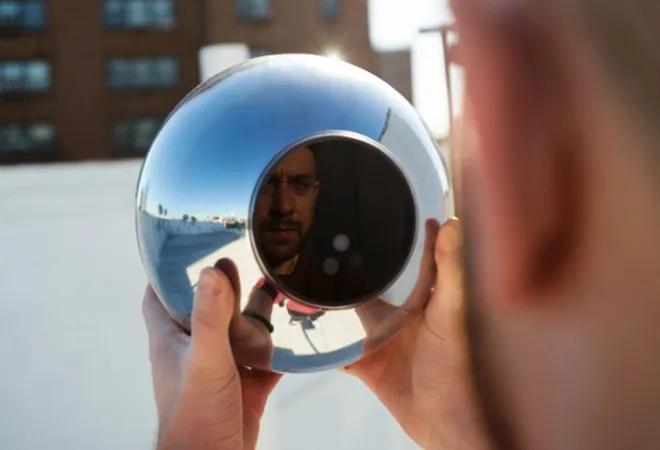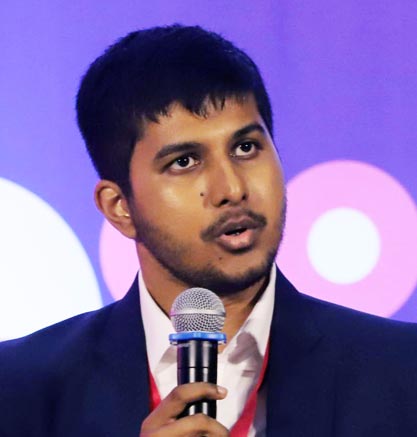-
CENTRES
Progammes & Centres
Location
Worldcoin aims to create a vast network that would benefit all individuals, but it raises concerns about exclusion and limited benefits for those outside the network

During his visit to India, Sam Altman, CEO of OpenAI, engaged in a conversation with Prime Minister Narendra Modi on the future of artificial intelligence (AI). While ChatGPT and generative AI have attracted significant attention, another venture, Worldcoin, backed by Sam Altman is embarking on an ambitious mission. Worldcoin strives to provide benefits to every individual worldwide through its distinct approach to decentralised identity and social welfare. Although Worldcoin shares some objectives with India's Aadhaar programme, its execution differs, raising concerns about data collection practices and internal operations. The extent to which it can fulfil its mission of benefiting all individuals worldwide remains uncertain. Nevertheless, it presents an intriguing experiment for decentralisation, unique identities, and social welfare.
Worldcoin aims to provide global social welfare through Universal Basic Income (UBI) by creating a worldwide distribution network. By leveraging network effects, as more people acquire Worldcoin, its utility will increase, promoting seamless transactions and financial inclusion for the unbanked.
Worldcoin wants to create the largest financial and identity network in the world. Decentralisation takes precedence, and the Worldcoin Foundation, a nonprofit organisation, supports its mission. The envisioned World ID claims to offer a privacy-preserving digital identity solution and the Worldcoin Token would be freely distributed to incentivise individuals for their unique identities. The World App would facilitate global payments and transfers using digital assets, stablecoins, and traditional currencies. By embracing early-stage decentralisation, allowing experimentation and iteration, Worldcoin wants to shape a future of universal financial inclusivity in an AI-dominated era.
By leveraging network effects, as more people acquire Worldcoin, its utility will increase, promoting seamless transactions and financial inclusion for the unbanked.
To achieve this, Worldcoin aspires to integrate its digital currency and crypto wallet into smartphones worldwide. However, the challenge lies in accurately verifying the unique identity of each individual. Worldcoin aims to build a privacy-conscious, proof-of-personhood network to prevent fraud and inequality. It uses "The Orb," a device that scans individuals' irises, to establish their distinct human status, but it comes with its own set of issues.
The development of a secure and unique identification system is of utmost importance for effective public service delivery. It is worth noting that governments worldwide already have forms of unique national identity cards, which rely on biometric data like fingerprints and iris scans to ensure the identification of their citizens. In this context, Worldcoin's ambition to develop an identification system for the potential future provision of universal basic income-like services appears intelligible. This objective aligns with India's digital and developmental journey, exemplified by the Aadhaar programme launched in 2009 to provide a unique identity to Indian citizens. Aadhaar has become a foundational pillar of India's digital infrastructure, encompassing elements such as Unified Payment Interface, a payments infrastructure, and a data storage and verification layer. These initiatives, coupled with programmes promoting financial inclusion, have yielded positive socioeconomic outcomes.
However, controversy arises when considering the development of a unique world ID, specifically the orb device that scans individuals' irises to create a global identity, which is dystopian and potentially unnecessary. Worldcoin's founders aim to circumvent reliance on government-issued IDs due to their lack of trust in governments. Having said that, Worldcoin has not provided a compelling case for users to place more trust in their platform and identification system than in their own government and its established identification methods. Trust is still beyond the horizon. In addition, there are already instances of data breaches. Multiple Worldcoin Orb operators have had their devices compromised by hackers who installed malware capable of stealing passwords. This unauthorised access grants the hackers complete control over the Worldcoin operator dashboard.
Controversy arises when considering the development of a unique world ID, specifically the orb device that scans individuals' irises to create a global identity, which is dystopian and potentially unnecessary.
The process of scanning people's irises worldwide is a laborious endeavour. It may be more prudent to prioritise interoperability and protocols for verifying government-issued IDs if the issue is distrust in governments. Developing protocols that cross-verify government IDs with other available data points on the internet could potentially eliminate the need for physically collecting biometric data worldwide from scratch.
Decentralisation is at the heart of this project. The Worldcoin initiative, however, with its objective of creating a unified identity across Web3, faces substantial backlash from the blockchain community. This community, rooted in the ideals of blockchain technology, decentralised finance, and decentralised autonomous organisations (DAOs), places great emphasis on prioritising anonymity and evading the perils of centralised recognition. Consequently, any system that places identity at the forefront, neglecting the crucial aspect of anonymity, raises legitimate concerns. It is also vital to understand that a mere act of decentralising frameworks, without careful contemplation, may not inherently lead to innovative or desired outcomes.
Organisations run on data, which makes data sourcing crucial. This pursuit has created global problems and disparities. Data colonialism is the appropriation of extensive data reserves in the Global South by the hegemonic forces of the data industry, particularly the United States (US) and China. These corporate behemoths often seize the opportunity to exploit the untapped data resources found in developing nations, skillfully disguising their endeavours as acts of benevolence.
Worldcoin has succeeded in generating interest among US users through demonstrations at cryptocurrency conferences, albeit denying the characterisation of these activities as formal field testing.
Worldcoin actively collects data through its orb, strategically targeting countries such as Indonesia, Sudan, and Kenya, which are classified by the World Bank as low- or lower-middle-income nations, thus rendering them enticing prospects for data exploitation. The more stringent data protection laws prevailing in Europe and the US pose constraints to organisations like Worldcoin, hindering entrepreneurs from accessing the necessary training data within their own populations. Consequently, such organisations are compelled to cast their gaze upon the developing world for data. Despite such hurdles, Worldcoin has succeeded in generating interest among US users through demonstrations at cryptocurrency conferences, albeit denying the characterisation of these activities as formal field testing.
The exact functioning of Worldcoin remains unclear, even with a worldwide ID system. While establishing IDs is essential for advancing payment and transaction solutions, Worldcoin's methods have sparked controversy and raised ethical concerns. It also highlights Silicon Valley's preoccupation with universal basic income (UBI), maybe reflecting performative altruism. The project's questionable adherence to rules and ethical guidelines raises doubts about its current support, particularly when alternatives like India's Aadhaar and UPI exist for financial inclusion and development. The central concern revolves around the security and trustworthiness of data, as the decentralised network lacks the usual anonymity found in such systems and collects sensitive information globally.
Worldcoin aims to create a vast network, sometimes coercing individuals into joining, with the eventual promise of benefits for users. However, it raises concerns about exclusion and limited benefits for those outside the network. Nonetheless, with US$ 100 million in funding and ongoing operations, Worldcoin continues to grow. It is best approached as a typical Silicon Valley startup: if successful, it holds the potential to benefit people; if not, it may become another project that fails to deliver on its promises. Only time holds the answers.
Sauradeep Bag is Associate Fellow at the Observer Research Foundation
The views expressed above belong to the author(s). ORF research and analyses now available on Telegram! Click here to access our curated content — blogs, longforms and interviews.

Sauradeep is an Associate Fellow at the Centre for Security, Strategy, and Technology at the Observer Research Foundation. His experience spans the startup ecosystem, impact ...
Read More +